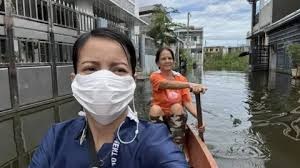MANILA, Philippines – The ongoing scandal surrounding anomalous flood control projects has taken a significant political turn, as a private citizen has formally requested that the Independent Commission for Infrastructure (ICI) investigate a possible connection between First Lady Liza Araneta Marcos and businessman Maynard Ngu, a figure implicated in the multi-billion-peso graft.
The request, submitted to the ICI, seeks to determine whether the First Lady potentially benefited from Ngu concerning the controversial projects.

The Request: A Letter of Sentiments, Not a Formal Case
The private citizen, identified as John Santander, delivered a letter to the ICI. He clarified that his action was not a formal filing of a case but rather a “letter of sentiments” aimed at prompting a thorough and impartial inquiry.
“There is no direct attack on our First Lady. Everyone should be investigated fairly,” Santander asserted, emphasizing his goal of seeking accountability without political bias.
As part of his submission, Santander provided photographs reportedly sourced online showing the First Lady and Maynard Ngu together. Ngu is described as a billionaire businessman whose name has been prominently linked to the anomalies plaguing the flood control projects—a scandal that has already seen numerous high-profile officials placed under scrutiny.
Media organizations are reportedly attempting to secure statements from both the First Lady and Ngu regarding Santander’s claims and the accompanying photographic evidence.
ICI Pledges Diligence, Urges Public Caution
The ICI, the body tasked with investigating the corruption, confirmed receipt of the letter and stated they would thoroughly examine the information provided by Santander. However, officials issued a caution to the public against accepting the allegations as fact before the conclusion of a formal probe.
An ICI spokesperson underscored the commission’s commitment to an objective investigation: “If there is a basis for the investigation to proceed, then we will move forward. We will investigate and we will make sure to call these people who will be responsible or who might be responsible for this flood control [scandal].”
The commission stressed its determination to keep the investigation focused and free from political interference. “We do not want our investigations to be derailed simply because of politics,” the spokesperson added, hinting at the sensitive nature of implicating a member of the President’s immediate family.

Calls for Transparency and Accountability
The ICI is also facing pressure from civil society groups demanding greater transparency in the proceedings. The organization Isang Bayan (One Nation) publicly called on the ICI to allow civil society representatives to act as observers during the investigative hearings, especially if the commission chooses not to publicize the proceedings.
“If there can be observers there, or representatives, even if we are not allowed to ask questions, we will simply listen,” a representative for the group stated. They noted the precedent set by previous high-stakes investigations, suggesting that if organizations like the US Embassy have been granted access in the past, a small group of non-government observers should also be permitted to dialogue with the commission to ensure the process is credible.
Continued Delays in Key Testimony
Meanwhile, the ICI investigation continues to be plagued by delays regarding critical testimony. For the second time, former Department of Public Works and Highways (DPWH) Undersecretary Roberto Bernardo failed to appear before the commission.
Bernardo reportedly cited illness as the reason for his non-attendance. The ICI announced that it would require a medical certificate from the former official and has postponed his next scheduled appearance to November 11 or 12, underscoring the difficulties the commission faces in compelling the attendance of key witnesses and suspects necessary to uncover the full scope of the multi-layered flood control anomaly.
The convergence of explosive allegations against the nation’s most powerful figures and the resistance encountered in securing witness cooperation ensures that the ICI’s investigation remains a focal point of intense national political scrutiny.





